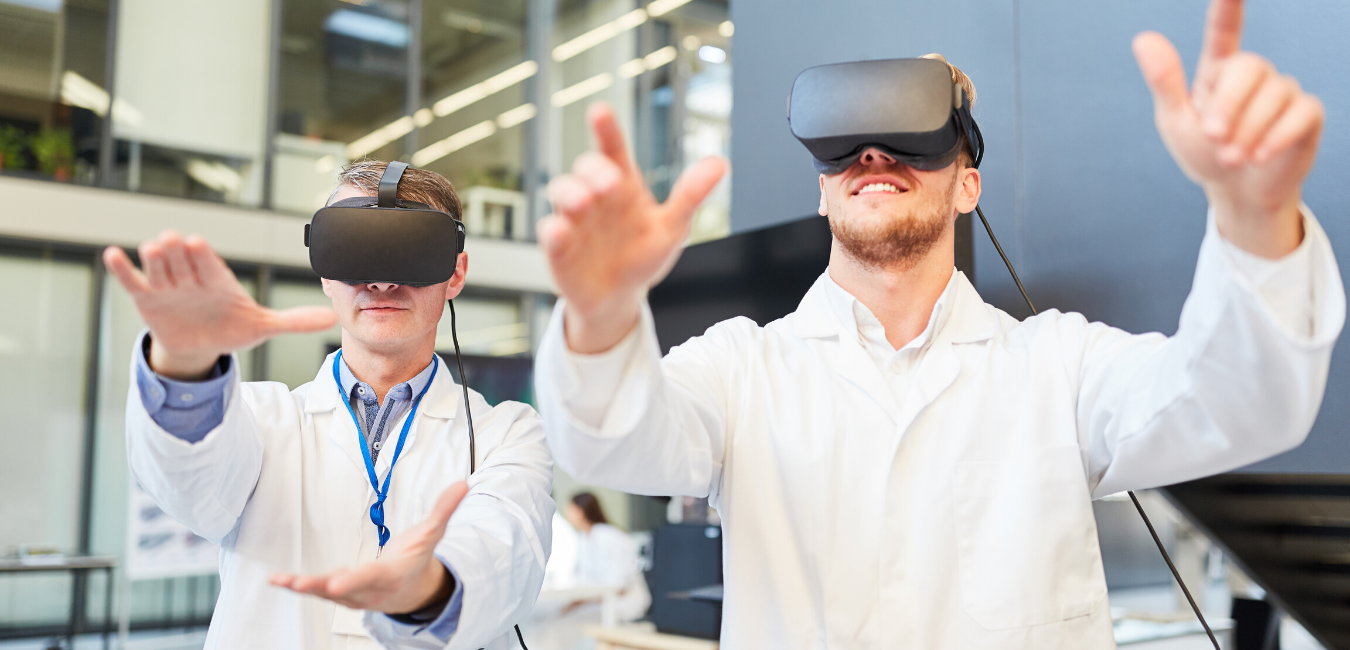5 Ways VR Training is Changing the Future of Healthcare

VR training has been driving innovations in the medical field and rapidly finding its ways into hospitals.
According to Fortune Business Insights, the virtual reality in healthcare market is expected to reach $30 billion by 2026. Despite being in its early growth stages, this technology is seen as revolutionary by industry experts with impacts that could benefit businesses across different industries. VR technology is already catalyzing changes in different aspects of our healthcare systems. Our focus in this post, however, will revolve around how virtual reality hospital training is transforming medical education, among other things.
1. Virtual reality hospital training for improved medical education
One of the most noteworthy applications of virtual reality in healthcare is perhaps its role in improving medical education for students. According to a recent publication in the National Center for Biotechnology Information, the growing application of VR simulation in teaching anatomy for medical students has effectively made VR training a key part of clinical training and medical education. Virtual reality in medicine, in this case, provides an opportunity for both learners and educators to benefit from a much more standardized, repeatable, and cost-effective learning. Here are a few takeaways in this aspect;
- Students learning with the help of a 3D human body object would surely get a better shot at understanding the complex engineering of the human body.
- VR simulation ensures better learning by giving students greater ease and precision for manipulation while eliminating the fears of making a mistake as is the case when working with a real specimen.
- The ability to overcome geographical barriers and accessibility challenges as this form of learning makes it much easier for students to access information remotely.
2. Improved patient education and wellbeing
Virtual reality hospital training also has positive implications for patients.
The future of VR in healthcare is quite promising, considering the technology has huge benefits and impacts for medical students, educators, medical professionals, patients, and medical institutions alike. For patients, VR applications could mean a better understanding of their condition to help them make well-informed choices.
This higher level of understanding has the potential to;
- Help patients get a better grasp of their diagnosis as well as possible treatment options and other choices and options to help prevent their condition from further deterioration.
- Foster trust and understanding between patients and their care providers.
- Helps to reduce patients’ anxiety about planned medical treatment and interventions
3. VR for surgical simulation training
No discussion on the future of VR in healthcare would be complete without the hugely beneficial impact of VR for immersive surgical simulation training. In this case, surgeons are able to conduct virtual surgical operations on virtual 3D models of patients with VR technologies.
This provides a higher level of visualization for surgeons, with a host of benefits and advantages that include;
- Learning new skills and gaining knowledge in a dynamic and ever-changing medical field without putting real humans at risk all while getting clear and precise feedback, and
- Incredible visualization to bolster the surgeon’s capabilities at the pre-operative stage, etc.
Virtual reality hospital training has emerged as an effective technique for teaching both surgeons and trainees.
This simulation training has found application in teaching both technical and behavioral skills as well as entire surgical procedures. There’s no doubt that the future of VR in healthcare will be shaped by factors like this as this technology is gradually emerging as a core part of the surgical education curriculum.
4. Medical storytelling and drug visualizations
Virtual reality in medicine also has benefits and implications beyond the walls of a hospital or medical classes.
This technology is accelerating various shifts in trends in different subsectors of the healthcare industry, thanks to the relevance of virtual reality for key developments like drug visualizations and medical storytelling.
These aspects of virtual reality in healthcare have raised the bar for marketing in the health industry with incredibly-enhanced scientific experiences. This immersive experience makes the audience feel like they’re actually witnessing the scene in real-life as red blood cells in their presence or follow a pathway, for instance.
These strategies are already being employed in marketing for pharmaceutical companies. The clearer visualization of the biological process makes it much easier for everyone at the table to understand the discussion whether that is a scientist, student, surgeon, businessman, or investor.
5. Therapeutic benefits for psychological disorders
Virtual reality has also shown great promise in the treatment of psychological disorders.
Studies have shown how successful this approach to psychotherapy can be for conditions like anxiety, autism, eating disorders, and sexual disorders, among others. Compared to the traditional biomedical approach, the success of virtual reality in healthcare in this regard is based on the effectiveness of the process to help patients create an environment where they are not only protected but can also re-create experiences.
This is somewhat similar to the application of VR for pain management, where patients feel like they have been catapulted into an entirely different emotional realm.
Virtual reality is still in its embryonic stages, no doubt.
However, current potential and developments like virtual reality hospital training point to a promising and interesting future of VR in healthcare. As more developments appear with this technology, so will more opportunities and applications open up for virtual reality in healthcare. The medical field is poised for a new phase of growth and VR technology is already shaping up to accelerate that transformation.

 Call
Call
 Mail
Mail